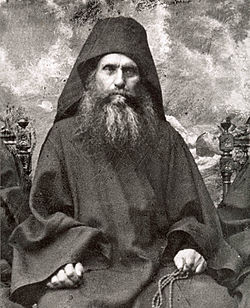|
Silouan the Athonite
Silouan the Athonite (Russian: Силуан Афонский) also sometimes referred to as Silouan of Athos, Saint Silvanus the Athonite or Staretz Silouan (January 17, 1866 – September 24, 1938) was an Eastern Orthodox monk of Russian origin, born Simeon Ivanovich Antonov who was a poet and monk of the St. Panteleimon Monastery.[1] The life and teachings of Saint Silouan were brought to light by his disciple, Archimandrite Sophrony (aka Saint Sophrony the Athonite, Saint Sophrony of Essex) in his classic book Saint Silouan the Athonite. LifeHe was born Simeon Ivanovich Antonov, of Russian Orthodox parents who came from the village of Shovskoye in Imperial Russia's Tambov Governorate. According to the biography compiled by Archimandrite Sophrony (Sakharov), St. Silouan of Athos worked in his youth as a carpenter in his brother's trade.[2] The heart of St. Silouan of Athos “ignited with love for God” after witnessing the miracles performed at the tomb of St. John of Sezenovski[3] At the age of twenty-seven, after a period of military service in the Imperial Russian Army, he left his native Russia and came to the monastic state of Mount Athos (an autonomous peninsula in Greece) where he became a monk at the Monastery of St Panteleimon, known as "Rossikon", an Orthodox monastery that houses Russian monks yet is, as all the Athonite monasteries, under the jurisdiction of the Patriarch of Constantinople. There, was given the name Silouan (the Russian version of the Biblical name Silvanus). St. Silouan of Athos was physically strong and spent all his nights in prayer.[4] According to residents, archeologists and pilgrims of Mount Athos, St. Silouan liked to pray on an oblong roadside stone, which has since been nicknamed “St. Silouan's Bench“. This stone lies on the side of the mountain path to this day.[5][6] The first “obedience” of St. Silouan of Athos was to work at the mill[7] An ardent ascetic, he received the grace of unceasing prayer and saw Christ in a vision. After long years of spiritual trial, he acquired great humility and inner stillness. He prayed and wept for the whole world as for himself, and he put the highest value on love for enemies. He became widely known as an elder. Silouan died on September 24, 1938. His memory is celebrated on September 24. Though barely literate, he was sought out by pilgrims for his wise counsel. Saint Silouan while still alive entrusted his writings to his disciple Father Sophrony, who was still a deacon at that time. Father Sophrony several years later travelled to Paris with the intention to publish the writings of his Elder. The first publication of his writings came out in Slavonic but very soon the book was translated into French and English as well as many more languages later. The text Adam's lament is a poem written by Saint Silouan contained in Part II - Chapter 18 of the book Saint Silouan the Athonite. The Estonian composer Arvo Pärt composed a classical choir piece with the lyrics based on this text. Monk Silouan was canonized as a Saint by the Ecumenical Patriarchate in 1987. Quotations
TroparionTroparion — Tone 4 On the path of humility, / by your prayers you received Christ as your Master. / In your heart the Holy Spirit witnessed to your salvation. / Therefore all people called to live in hope rejoice and celebrate your memory! / Holy Father Silouan, pray to Christ God to save our souls.[8] References
Further reading
External links
|
||||||||||||||
Portal di Ensiklopedia Dunia

